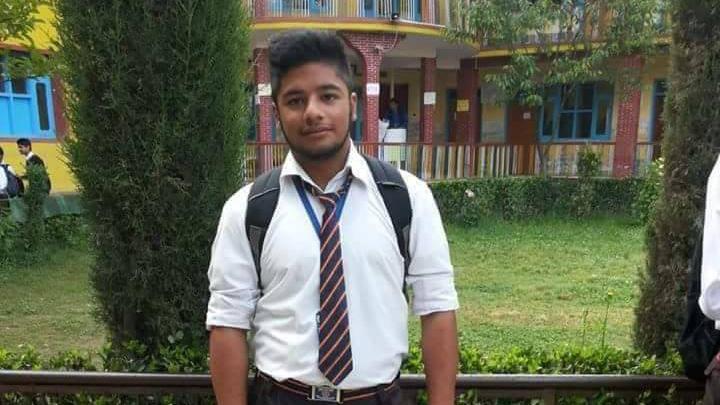Farhan Wani: The 16-year-old was killed in a firefight with Indian security forces near Kokernag
Last June, Farhan Wani left his house in the village of Khudwani, in south-western Kashmir, to attend his physics tuition class. He never came home — instead, he joined a group of militants fighting for Kashmir’s independence from India.
On Tuesday, Farhan, 16, was killed in a firefight with Indian security forces near Kokernag, an hour’s drive from Khudwani. Militants opened fire when police launched a cordon-and-search operation in a forested area, officials told reporters after the incident. Three militants escaped during the gun battle.
The news of Farhan’s death was the first piece of information that his parents had received about their son’s whereabouts since they learnt he had joined the separatist organisation Hizbul Mujahideen. They have offered no comments following their son’s death.
Farhan’s death underscores the ongoing, tragic, waste of life that has resulted from Kashmir’s 30-year conflict. In 2017, 57 civilians were killed as a result of violence — the highest number since 2008, according to statistics maintained by the Institute for Conflict Management, a New Delhi-based think tank.
At least 218 militants were also killed in 2017. many of them were young men like Farhan who were drawn to the separatist movement and its ideals.
When he left to join Hizbul Mujahideen, Farhan had just recently begun Year 11. He was a model student. In his Year 10 exams, his grade point average was 9.6 out of 10. His friends called him “Bahadur”—“the brave.”
A photograph on Facebook shows him standing in his uniform in front of his school, his shirtsleeves rolled up, shoes slightly scuffed, and his tie loosened — an unsuspecting young man with a genial face and the rudiments of a beard.
Farhan was the youngest of three siblings, born into a financially stable family. His father, was a schoolteacher.
“It wasn’t the kind of family you’d expect to produce a militant,” an Anantnag-based reporter who asked to remain anonymous told The National.
But increasingly, groups like the Hizbul Mujahideen and the Lashkar-e-Taiba are drawing recruits in their teens and early twenties. The new militants are hastily trained in the use of weapons and sent into the field, where they don’t often live long.
“The average life of a person after they join militancy is two to six months,” said Anantnag police officer, Altaf Khan, during a press conference in November.
The most famous example of this is Burhan Wani, killed in 2016 at the age of 21. Like his namesake Farhan, Wani was the son of a school principal who left home to join the Hizbul Mujahideen. But unlike his namesake, Wani survived nearly five years in the group before being killed by security forces in the summer of 2016.
His death sparked a storm of protests in Kashmir and Wani’s active social media presence may have provided inspiration for other young men to enlist in militancy.
“Everyone wanted to be like Burhan,” Fahad Shah, the editor of the Kashmir-based magazine Kashmir Walla, said. “They saw him as a new hero. If you walked through a Kashmiri town, you’d see graffiti about Burhan every 50 metres or so.”
Eighty-eight young men joined militant groups in 2016, and 117 joined in 2017 — the first time the figure surpassed 100 since these statistics were first compiled in 2010, according to the Jammu & Kashmir police.
Many of these men were talented and well-off, like Farhan Wani.
“There’s a whole generation of youngsters who are frustrated, highly educated people with aspirations,” said D Chitralekha, a sociologist at New Delhi’s Jawaharlal Nehru University. “To be stopped at every checkpoint, to have to show your ID everywhere, to not have access to the usual things you and I cannot live without — this is all frustrating.”
Perhaps in response to this trend, Kashmiri police last November announced a new surrender policy, assuring “local boys” that the state would help them back into their old lives. A helpline was set up, for militants wanting to call in to surrender.
In Farhan’s district of Anantnag, a promising footballer named Majid Khan, 20 years old, joined the Lashkar-e-Taiba on November 9. His story turned out differently. Mr Khan’s mother posted a video on social media, tearfully begging him to come home. Mr Khan returned and surrendered within a week.
Inspired, the parents of at least seven other families in Kashmir immediately recorded videos, asking their sons to return. Farhan’s father, for his part, wrote an anguished Facebook post on November 24.
“Since you left us, my body has started to betray me,” Mr Wani wrote. “I can’t explain how much I miss your smiling face … Dear son, we request you to return and start again, and we will help you in every manner possible.”
Mr Wani’s words proved sadly prophetic. “The path you have chosen will not lead you anywhere other than [to] pain, stress and betrayal,” he wrote, “and maybe a time will come when you will never see us again.”




